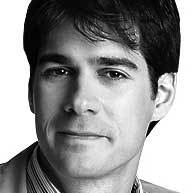
Since my first column, 19 years ago, readers and co-workers have clamored to have me fired. The first time I visited TIME’s L.A. bureau, I saw one of my columns taped outside a science reporter’s door, with sentences crossed out by red Sharpie accompanied by the words “This is what TIME magazine has become!” When I introduced myself to Gore Vidal on a flight, he ranted about how TIME’s editor at the time, Walter Isaacson, had destroyed the magazine by bringing in solipsistic young people who write in first person. I nodded in agreement, thinking, Gore Vidal knows about me!
But TIME has finally come to its senses, and it’s time for the Awesome Column to end. I know this will be as hard for the reader as it is for me, though I’m assuming here that the reader got paid a lot of money to read this column.
I wanted to provide closure, and since as a columnist I was always more of a character than a person, I sought advice from writers who have worked on television finales. “It should be the funniest, most profound, most emotionally resonant column of them all,” said Vince Gilligan, creator of Breaking Bad. “The best way to achieve this is to hold back on all your previous columns. Anyway, that worked for us.” This was something I’d figured out when I wrote my first column, about rooting for an escaped death-row prisoner, despite the fact that of all the demographics to court as long-term readers, death-row prisoners are the worst. Jenji Kohan, who created Orange Is the New Black when her show Weeds was being canceled, was more worried about me: “Start a new column for another publication so you can avoid all the feels,” she said. “And do it quick before you disappear.” I could not understand how she had trouble getting people to keep watching a show about marijuana.
Damon Lindelof, who ended both Lost and The Leftovers, took me out to breakfast and advised the opposite. “I would feel ripped off if it’s, ‘O.K., off to bigger and better things.’ I want to feel a little bit sad. Because I’m feeling sad about it. And good finales take how the audience is feeling about the finale and put that into the content.” This was very helpful, though not nearly as helpful as offering me a job, which clearly was why I contacted all these people.
Finally, Larry David gave me some oddly specific advice that he got after ending Seinfeld: “Tell everyone what it’s about ahead of time so that nobody can have any preconceived notions or feel disappointed after.” I couldn’t figure out how to do that. Because I never really knew what this column was about. I was so excited to get a wall to graffiti that I didn’t try to convince the reader of my opinions. I was just figuring out what I thought by seeing what I wrote.
So I called Walter Isaacson, who–in the greatest moment of my career–walked into my tiny office and gave me a column. I asked him what I should have asked that day: What was its purpose? Was it speaking truth to power? Or providing a voice for my generation? Or delivering personal, embarrassing truths about living in our changing culture?
“Time magazine took itself too seriously, and I thought you would be an amazing antidote. It infused a little bit less self-seriousness in the other writers,” he said as he boarded a plane, returning from giving a speech about his new 624-page biography of Leonardo da Vinci.
Other writers might be disappointed to find out they were just a clown and that everything in between their desperate stabs at humor was filler. But I was thrilled I got to create all that filler. Looking back, I do think that, other than with Walter himself, I accomplished the task he gave me. And now that I have, I think TIME needs another kind of antidote.
When I arrived at TIME, there were hooks on the inside of our office doors for our suit jackets, and editors had an entire meeting about whether I could print the word wuss. The magazine is far less stuffy now. As is the whole world. It was fun to be a sex-obsessed narcissist who was only interested in how the news affected him when I was writing for readers who had survived 120 pages of serious news before me. Now the issues are smaller and filled with news about a sex-obsessed narcissist who is only interested in how the news affects him.
There are times when society needs a punk who doesn’t care. There are far fewer times when society needs a 46-year-old punk who doesn’t care. I’ve always been guilty of hanging on too long out of fear of graduating college, ending relationships and transitioning from democracy to authoritarianism. I look forward to a future columnist who makes me laugh about that.
More Must-Reads From TIME
- What Student Photojournalists Saw at the Campus Protests
- How Far Trump Would Go
- Why Maternity Care Is Underpaid
- Saving Seconds Is Better Than Hours
- Welcome to the Golden Age of Ryan Gosling
- Scientists Are Finding Out Just How Toxic Your Stuff Is
- The 100 Most Influential People of 2024
- Want Weekly Recs on What to Watch, Read, and More? Sign Up for Worth Your Time
Contact us at letters@time.com